-
01-01-2018
El cuidado en la Atención Primaria de Salud: vivencia de las enfermeras
Revista Brasileira de Enfermagem. 2018;71:531-537
Abstract
El cuidado en la Atención Primaria de Salud: vivencia de las enfermeras
Revista Brasileira de Enfermagem. 2018;71:531-537
DOI 10.1590/0034-7167-2016-0244
Views0See moreRESUMEN
Objetivo:
comprender el significado de realizar cuidados de enfermería en la Atención Primaria de Salud desde la perspectiva de las enfermeras chilenas.
Método:
investigación cualitativa con enfoque desde la fenomenología social de Alfred Schütz. La recolección de datos fue realizada entre enero y abril del 2013, a través de entrevista con 13 enfermeras de Atención Primaria en Chile.
Resultados:
las enfermeras perciben el cuidado como una experiencia gratificante considerando un encuentro de subjetividades. Sin embargo, se sienten sobrecargadas por múltiples funciones a realizar y por presiones jerárquicas en el logro de las metas. Aspiran implementar cuidados innovadores manifiestados por el deseo de superar el cuidado tradicional y la eficiencia de la gestión de los diversos niveles de atención de la salud.
Conclusión:
es importante discutir estos resultados en el contexto de la asistencia y especialmente en la formación, con el fin de preparar mejor a las enfermeras que brindarán cuidados en este nivel de atención.
-
RESEARCH01-01-2018
Obstacles in the detection and reporting of tuberculosis cases: a discursive analysis
Revista Brasileira de Enfermagem. 2018;71:523-530
Abstract
RESEARCHObstacles in the detection and reporting of tuberculosis cases: a discursive analysis
Revista Brasileira de Enfermagem. 2018;71:523-530
DOI 10.1590/0034-7167-2016-0673
Views0See moreABSTRACT
Objective:
To analyze the discourses of health professionals about the obstacles in the process of detection and reporting of tuberculosis cases in Mozambique.
Method:
Qualitative exploratory study with a theoretical-methodological approach of Discourse Analysis of French matrix. The study was conducted in Mozambique in 2014 at three levels: central, provincial and district. The study included 15 health professionals, 4 physicians, 6 technicians and 5 nursing professionals, who worked in the National Tuberculosis Control Program, with more than 1 year of experience.
Result:
The following discursive blocks emerged: Detection of tuberculosis cases in laboratories; Underreporting of tuberculosis cases; Obstacles to detect cases of tuberculosis: long distances and lack of transport; and Reporting of cases for decision making.
Final considerations:
The discourses analyzed point to the ideological affiliation that includes the lack of investment policies in the health sector and the political commitment as basic obstacles in the detection and reporting of tuberculosis cases.
-
RESEARCH01-01-2018
Quality of life of elderly people living with HIV/AIDS in outpatient follow-up
Revista Brasileira de Enfermagem. 2018;71:513-522
Abstract
RESEARCHQuality of life of elderly people living with HIV/AIDS in outpatient follow-up
Revista Brasileira de Enfermagem. 2018;71:513-522
DOI 10.1590/0034-7167-2017-0127
Views0See moreABSTRACT
Objective:
To analyze factors related to the quality of life of elderly people living with HIV/AIDS.
Method:
A cross-sectional study was carried out with people aged 50 years or more in a specialized outpatient clinic. The data collection was by means of an interview. For the analysis of data and characterization of the sample, descriptive statistics and comparison tests were used. The project met the ethical requirements.
Results:
Participants were 81 users aged 50 to 75 years, mean age was 57.8 (± 6.1) years, 71.6% of whom were men. There was a statistically significant relationship with the quality of life, the following variables: gender, children, occupation, religion, diagnosis time, HIV exposure, adverse effects, treatment interruption, viral load counts, hospitalization, dependence for daily activities and use of drugs.
Conclusion:
The results suggest that the quality of life deficit is related not only to physical changes, but to the anguish and stigma related to HIV/AIDS.
-
RESEARCH01-01-2018
Alcohol consumption, Quality of Life and Brief Intervention among Nursing university students
Revista Brasileira de Enfermagem. 2018;71:505-512
Abstract
RESEARCHAlcohol consumption, Quality of Life and Brief Intervention among Nursing university students
Revista Brasileira de Enfermagem. 2018;71:505-512
DOI 10.1590/0034-7167-2017-0692
Views0See moreABSTRACT
Objective:
To evaluate nursing university students’ alcohol consumption patterns, Brief Intervention and Quality of Life (QoL).
Method:
This is a prospective and longitudinal study containing sociodemographic, economic information concerning alcoholic beverages, BI and QoL evaluation among 281 nursing university students. Since surveys have been applied, seminars have been given and consumption patterns have been discussed, an educational material was delivered after university students’ revaluation and BI reinforcement. Descriptive and analytical statistics have been conducted.
Results:
90% of the students have already consumed alcohol and 20.6% that consumed for the first time and abused alcohol were minors. After the implementation of BI, the alcohol consumption has decreased among university students. Besides the vitality, generate state of health, and emotional aspects have decreased, mental health was substantially low among the students that used to drink.
Conclusion:
BI contributes to decrease alcoholic beverages consumption and promotes health.
-
RESEARCH01-01-2018
Reflections and collective production about being a municipal health counselor
Revista Brasileira de Enfermagem. 2018;71:496-504
Abstract
RESEARCHReflections and collective production about being a municipal health counselor
Revista Brasileira de Enfermagem. 2018;71:496-504
DOI 10.1590/0034-7167-2017-0369
Views0See moreABSTRACT
Objective:
to identify the participation dynamics of a municipal council and to develop a critical-reflexive process on “being a counselor”, identifying weaknesses and possibilities of this council, in addition to collectively generating new knowledge and (re)elaborating the MHC Ordinary Law.
Method:
Convergent care research, including documentary analysis, non-participant observation and thematic workshops. The research was carried out in 2016, with municipal health counselors from a city in the Western Region of Santa Catarina.
Results:
this study made it possible to identify forms of social participation that should be strengthened in the performance of social power, to reflect and share individual experiences, to anchor them in the current legislation, and to build knowledge that enabled the elaboration/organization of a product – a new text for the Ordinary Law of the Council, adjusted to current legislation.
Final considerations:
There is a need to increase participation, considering the presence of the counselors in the meetings, the effective representation and a greater interaction in the discussions and deliberations of the council.
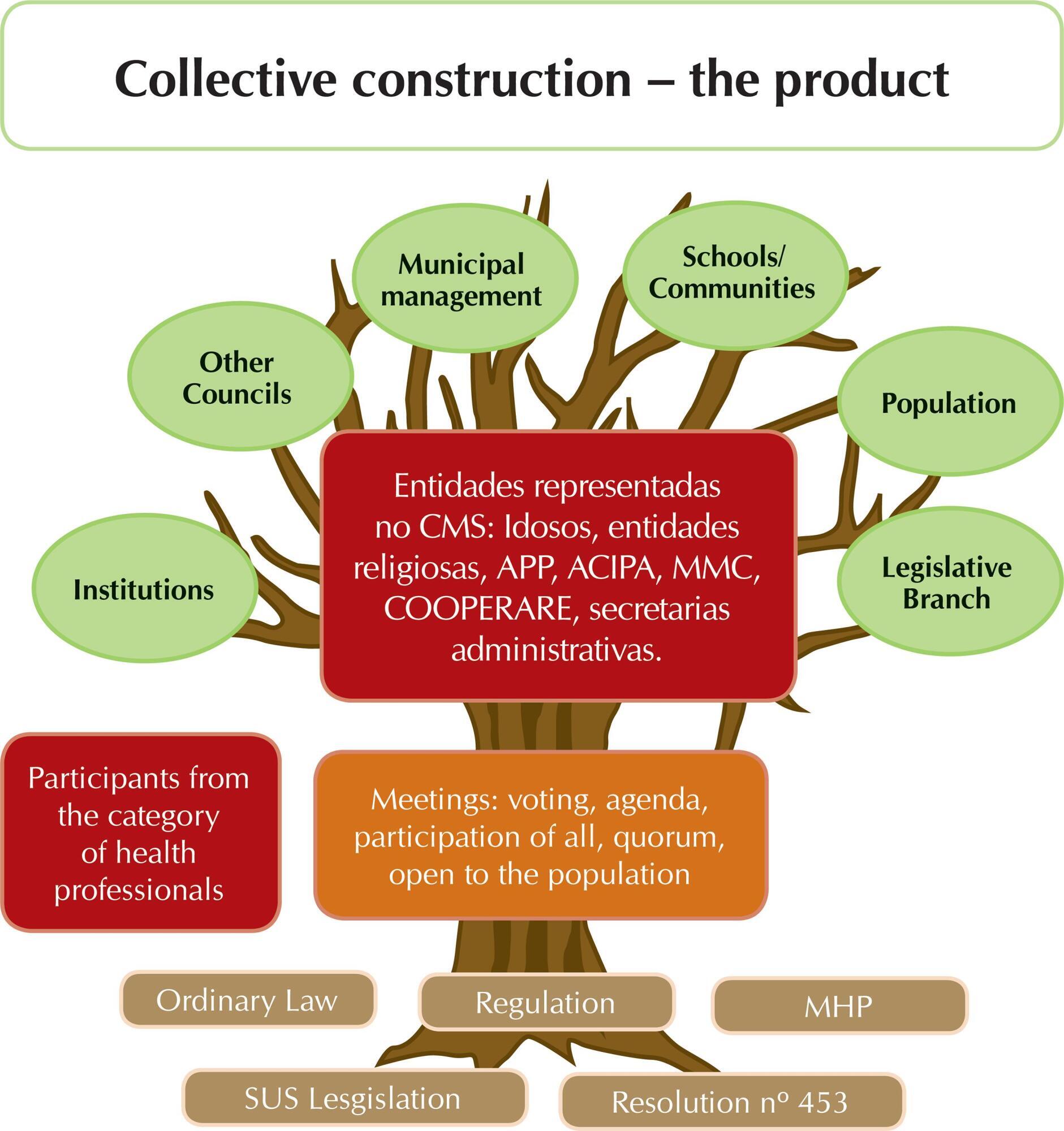
-
RESEARCH01-01-2018
Social network: evaluation of the support or containment contexts of lesbian mothers
Revista Brasileira de Enfermagem. 2018;71:490-495
Abstract
RESEARCHSocial network: evaluation of the support or containment contexts of lesbian mothers
Revista Brasileira de Enfermagem. 2018;71:490-495
DOI 10.1590/0034-7167-2017-0419
Views0See moreABSTRACT
Objective:
To evaluate the social network of lesbian mothers, from the social contexts of support or restraint.
Method:
Descriptive, exploratory study, of qualitative approach, based on the theoretical reference of Social Network, with eight lesbian mothers selected through Snowball technique, using semi-structured interview. Data analysis was performed with IRAMUTEQ software, through Similarity Analysis.
Results:
The social network is configured as: 1) Emotional distance and non-acceptance of motherhood by the family members – primary network elements; 2) Interference in the socio-cultural medium for the effectiveness of the mother-child bond – secondary network elements.
Final considerations:
Social network is grounded on trivialized and negative conceptions that highlight prejudice and disrespect. The discussion of this theme contributes to a greater visibility of those new family arrangements as well as to reduce stigmas e prejudices that pervade the social network components of these women.
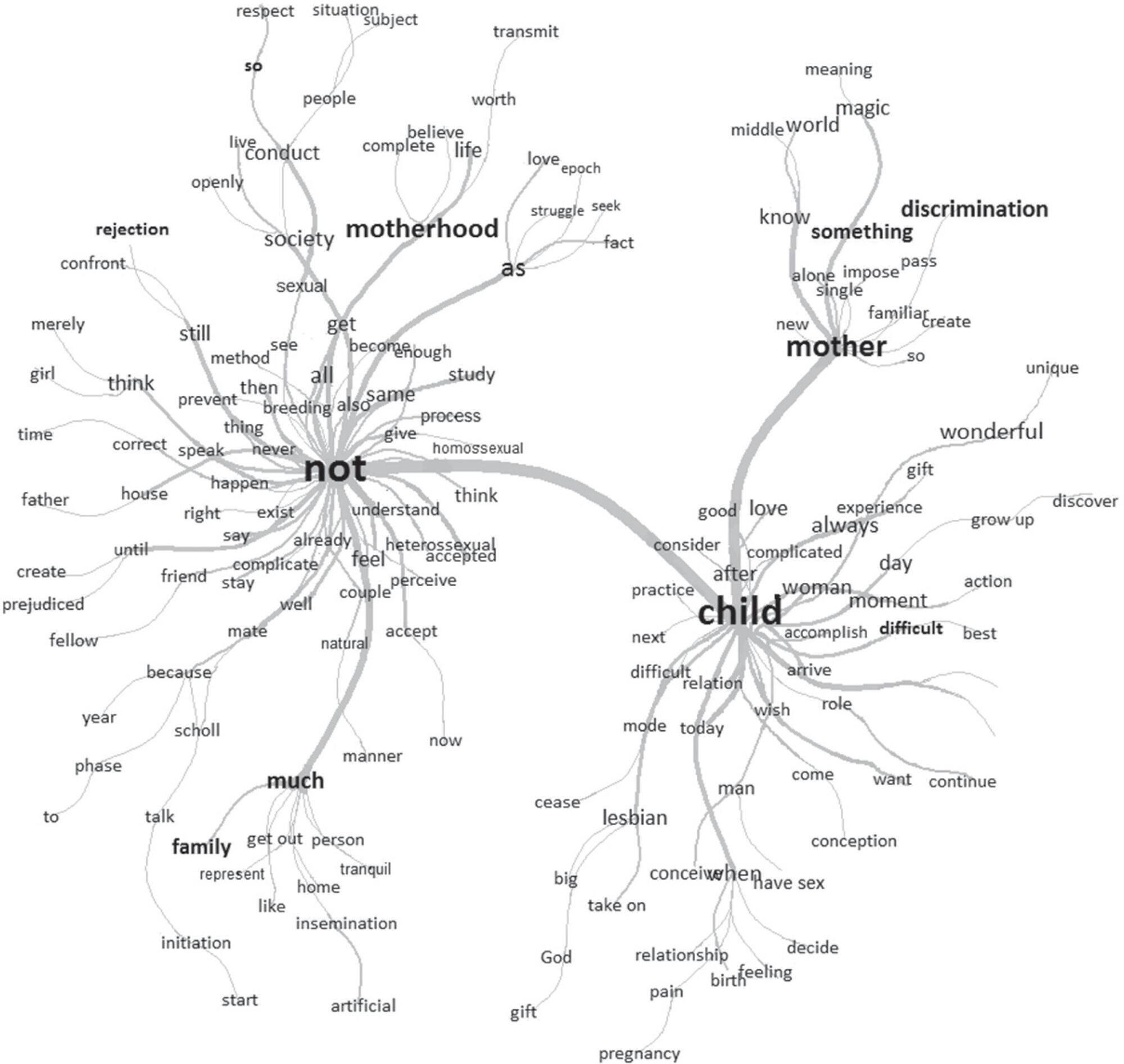
-
RESEARCH01-01-2018
Wellness room as a strategy to reduce occupational stress: quasi-experimental study
Revista Brasileira de Enfermagem. 2018;71:483-489
Abstract
RESEARCHWellness room as a strategy to reduce occupational stress: quasi-experimental study
Revista Brasileira de Enfermagem. 2018;71:483-489
DOI 10.1590/0034-7167-2017-0572
Views0See moreABSTRACT
Objective:
To compare occupational stress levels of nurse staff working in the surgical unit before and after the intervention “wellness room”.
Method:
Quasi-experimental study with a sample of 60 nurse staff working in a surgical unit of a teaching hospital in the Southern Region of Brazil. The intervention was conducted in a room in the workplace for six months and consisted of sections of aesthetic care, relaxation, lectures and workshops to reduce occupational stress. Data were collected through the Demand-Control-Support Questionnaire before and after the intervention, and the comparative analysis was performed by the Wilcoxon test.
Results:
After the intervention, there was a decrease in demand and an increase in control and in the social support received at work in all professional categories, but the differences were not statistically significant.
Conclusion:
The intervention “wellness room” reduced occupational stress levels in the sample studied; however, it was not a significant decrease.
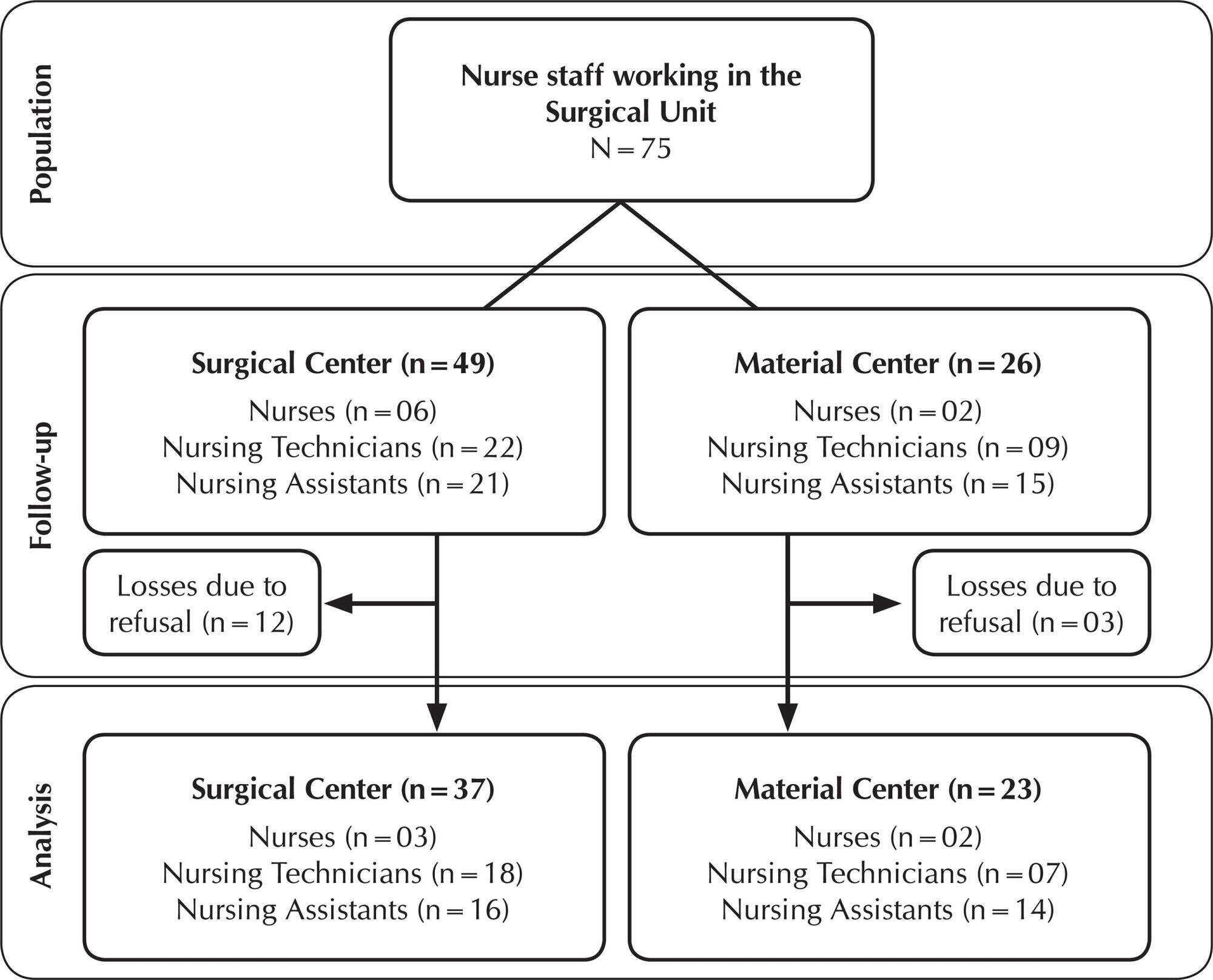
-
RESEARCH01-01-2018
Characterization of users at risk of developing diabetes: a cross-sectional study
Revista Brasileira de Enfermagem. 2018;71:475-482
Abstract
RESEARCHCharacterization of users at risk of developing diabetes: a cross-sectional study
Revista Brasileira de Enfermagem. 2018;71:475-482
DOI 10.1590/0034-7167-2017-0776
Views0See moreABSTRACT
Objective:
To characterize the profile of users at risk of developing diabetes mellitus type 2 according to sociodemographic and clinical variables.
Method:
Cross-sectional study, descriptive, quantitative approach conducted with 266 users of Basic Care. Inferential statistics analysis, calculating the crude prevalence ratio with confidence interval of 95% and Kruskal-Wallis test, and application of the multivariate technique simple Correspondence Analysis.
Results:
It was noted that 83.1% were women and 36.4% frequented the Family Health Unit from 1 to 5 years. Regarding the factors associated with diabetes mellitus type 2, 66.5% of the users were overweight and 77.9% were rated with central obesity. The great majority, 77.4%, did not practice physical activities and 21.1% had altered glycemia.
Conclusion:
The results showed that many risk factors for developing diabetes mellitus type 2 were among the population of the study.
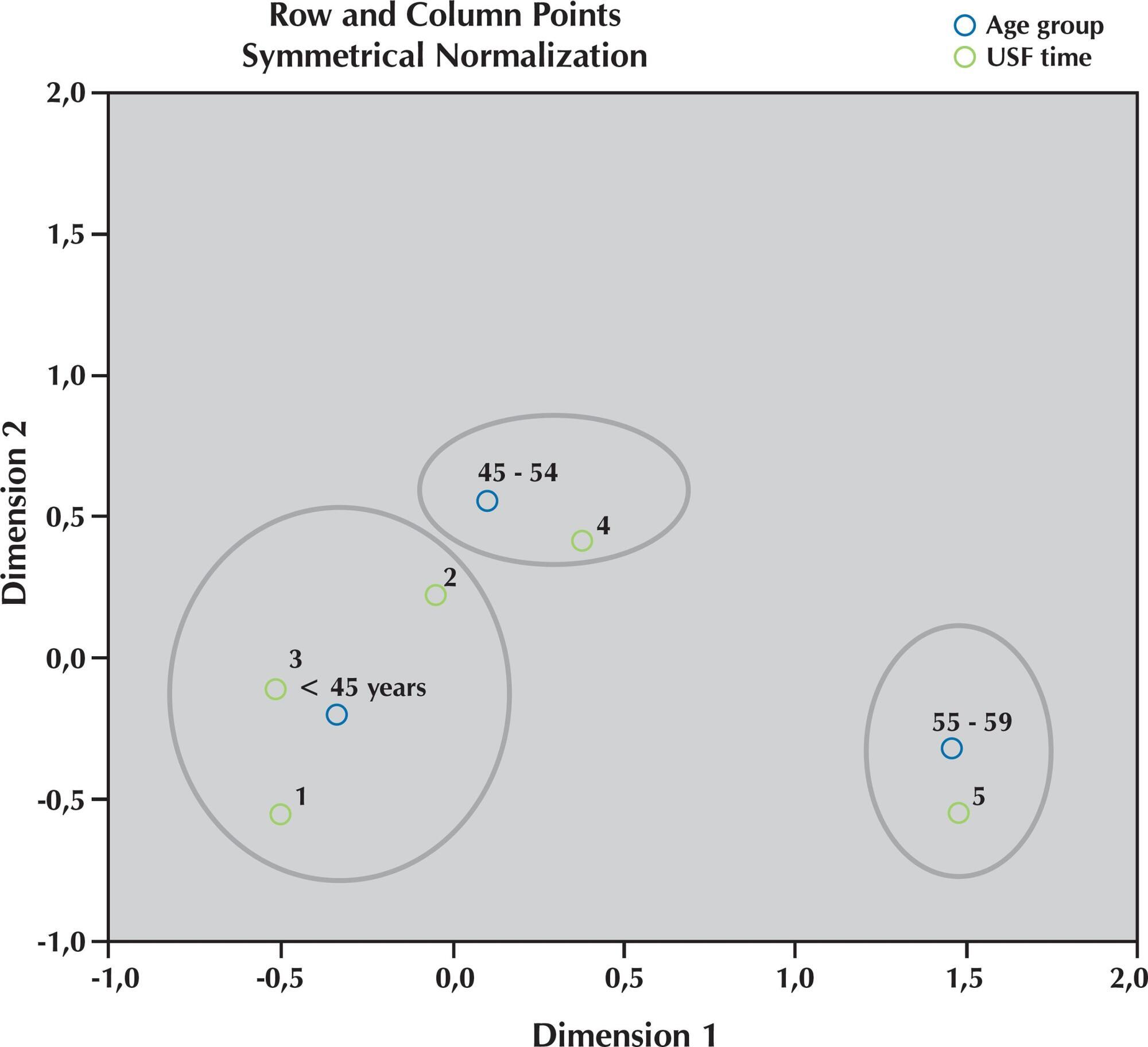
-
ERRATUM04-22-2020
ERRATUM
Revista Brasileira de Enfermagem. 2020;73(3):202073n3e05
Abstract
ERRATUMERRATUM
Revista Brasileira de Enfermagem. 2020;73(3):202073n3e05
DOI 10.1590/0034-7167.202073n3e05
Views0Article “Concept formation of ambience for labor and normal institutionalized delivery”, with number of DOI: , published in the journal Revista Brasileira de Enfermagem, 72(Suppl 3):348-59, on page 357:Include after Final Considerations the information:[…]See more -
ORIGINAL ARTICLE04-09-2020
Health promotion in schools: speeches, representations, and approaches
Revista Brasileira de Enfermagem. 2020;73(3):e20180774
Abstract
ORIGINAL ARTICLEHealth promotion in schools: speeches, representations, and approaches
Revista Brasileira de Enfermagem. 2020;73(3):e20180774
DOI 10.1590/0034-7167-2018-0774
Views0See moreABSTRACT
Objectives:
to analyze speeches, representations, and approaches on health and health promotion in schools, materialized in the speech of teachers.
Methods:
a qualitative study, of the case study type, carried out with 17 teachers from the municipal and state educational network. The data were obtained from interviews and analyzed by the Content-Oriented Discourse Analysis.
Results:
medical-sanitary and clinical-biological discourses predominated. Health is represented as the absence of disease, reflecting approaches that prioritize healthy habits and changes in behavior. Problematization of social determinants occurs in projects, in an intersectorial partnership.
Final Considerations:
carrying out projects of health promotion in schools ignores the solidification of partnerships and the construction of new speeches that represent it as quality of life conditioned by social, economic, and cultural factors as well as strategies for the ideological repositioning of those actors who act in this setting.
-
ORIGINAL ARTICLE04-09-2020
Nursing work and competence in hemotherapy services: an ergological approach
Revista Brasileira de Enfermagem. 2020;73(3):e20180775
Abstract
ORIGINAL ARTICLENursing work and competence in hemotherapy services: an ergological approach
Revista Brasileira de Enfermagem. 2020;73(3):e20180775
DOI 10.1590/0034-7167-2018-0775
Views0See moreABSTRACT
Objetives:
to analyze the ingredients of the competence that the nurses use in the performance of their work in hemotherapy.
Methods:
qualitative study with 22 nurses, accomplished through documentary study, observation and semi-structured interview, with resources of Atlas.ti software based on the foundations of Historical Materialism Dialectic and Ergology. Performed Content Analysis.
Results:
the domain of specific knowledge of hemotherapy and the time of experience in the area, allied to the motivation of the worker and the ability to work in a team favor the competent action in the work activities. On the other hand, the lack of adequate work conditions, especially in relation to adequate materials, equipment and structure, impairs the work of the nurse in hemotherapy.
Final Considerations:
experience gained is critical to successful decision making. In addition, adequate working conditions, updating of knowledge and ability in teamwork favor a scenario of safe practices.
-
ORIGINAL ARTICLE04-22-2020
Happiness as a strength in the promotion of adolescent and adult young health
Revista Brasileira de Enfermagem. 2020;73(3):e20190064
Abstract
ORIGINAL ARTICLEHappiness as a strength in the promotion of adolescent and adult young health
Revista Brasileira de Enfermagem. 2020;73(3):e20190064
DOI 10.1590/0034-7167-2019-0064
Views0See moreABSTRACT
Objectives:
to assess the relation between sociodemographic characteristics of young people associated with the subjectivity of being happy; to evaluate the relationship between the subjectivity of being happy and the perception of health status; to evaluate the relationship between the subjectivity of being happy and the school and family environments and peer groups at school.
Methods:
this is an observational study, with an intentional sample of 1,069 young Portuguese people, with ages varying from 14 to 24, most of them women, attending secondary education. The self-filling questionnaire was used.
Results:
there are statistically significant associations between the subjectivity of being happy and schooling, perception of health status, family APGAR, school and family involvement, absence of problems or teasing by peers at school.
Conclusions:
a positive and holistic care coupled with the potential of obtaining and consolidating healthy lifestyles for young people will enable health professionals to perceive them as agents of individual and social change.
-
ORIGINAL ARTICLE04-22-2020
Preventing vertical HIV virus transmission: hospital care assessment
Revista Brasileira de Enfermagem. 2020;73(3):e20190491
Abstract
ORIGINAL ARTICLEPreventing vertical HIV virus transmission: hospital care assessment
Revista Brasileira de Enfermagem. 2020;73(3):e20190491
DOI 10.1590/0034-7167-2019-0491
Views0See moreABSTRACT
Objectives:
assess the implementation of actions to prevent vertical transmission of HIV.
Methods:
a retrospective cohort study conducted in two maternity hospitals in the city of Montes Claros, State of Minas Gerais. All women admitted for childbirth diagnosed with HIV and their respective newborns were included from 2014 to 2017. Data were collected from medical records and analyzed descriptively.
Results:
population consisted of 46 pairs of mothers and newborns. Management was considered inadequate in 30 cases of parturient/postpartum women (65.2%) and 14 cases of newborns (30.4%). The main reasons for inadequate maternal management were lack of pharmacological inhibition of lactation (53.3%) and counseling/consent for HIV testing (43.3%). For newborns, late onsetoffirst dose ofZidovudine (50.0%) and no prescriptionofNevirapine (28.6%).
Conclusions:
important prevention opportunities were missed, pointing to the need for improved care.
-
ORIGINAL ARTICLE06-08-2020
Maternal-child nursing care for adolescent mothers: health education
Revista Brasileira de Enfermagem. 2020;73(4):e20180769
Abstract
ORIGINAL ARTICLEMaternal-child nursing care for adolescent mothers: health education
Revista Brasileira de Enfermagem. 2020;73(4):e20180769
DOI 10.1590/0034-7167-2018-0769
Views0See moreABSTRACT
Objectives:
to develop an educational intervention through a game that addresses aspects related to adolescent motherhood and child care.
Methods:
this is an action research based on diagnosis, intervention and apprehension stages.
Results:
the situational diagnosis was based on a literature review on adolescent motherhood and child care. In the intervention stage, the educational game’s first version was elaborated. In the third stage constituted by apprehension, the game was submitted to assessment of interdisciplinary experts. Suggestions of experts were adopted and the game had its second version.
Final Considerations:
the educational intervention in the present study appears a care technology that adds knowledge and practices to the work of nurses in Primary Health Care, focusing on adolescent women and children health care.
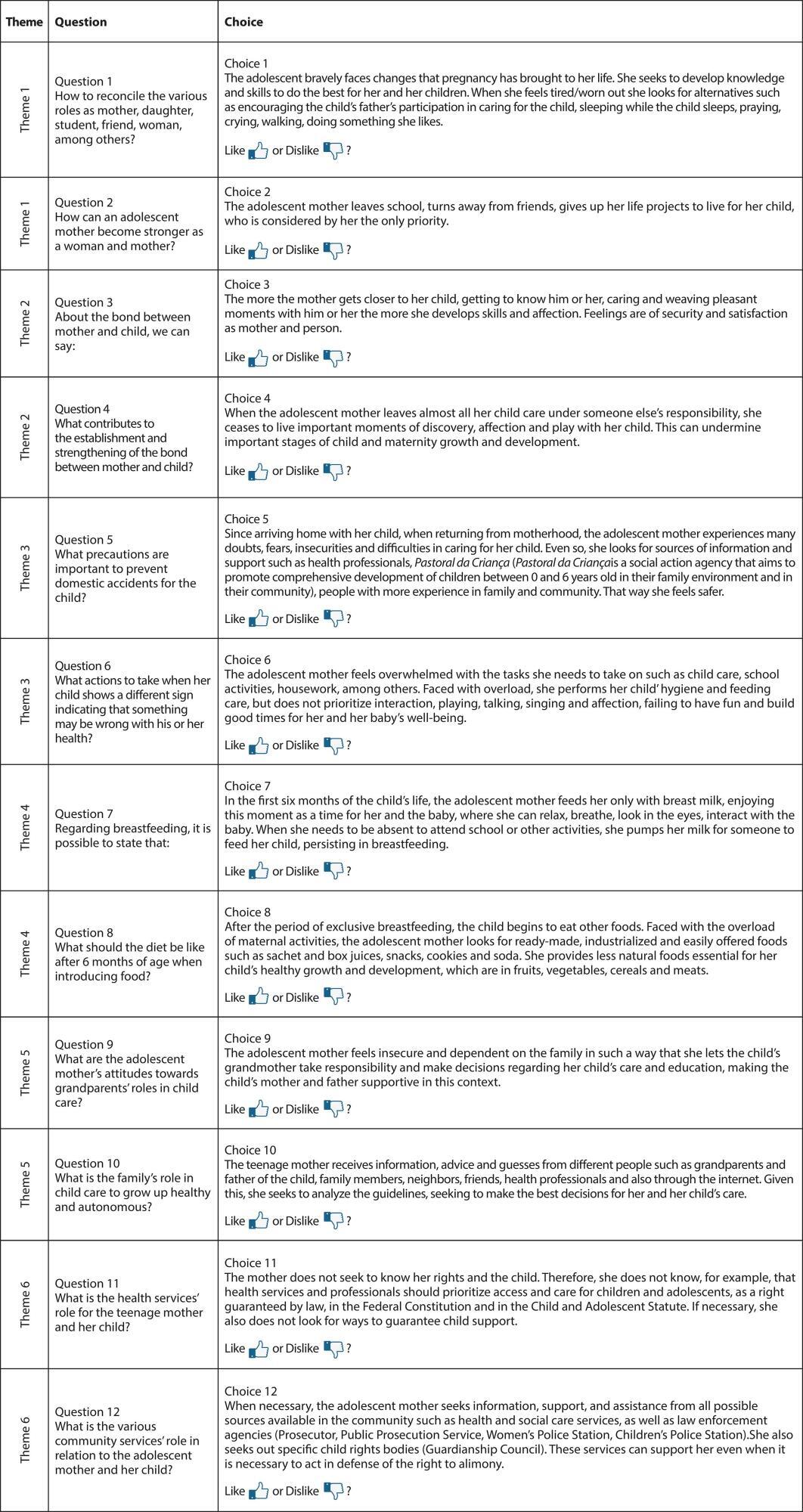
-
REVIEW06-01-2020
Access of the black population to health services: integrative review
Revista Brasileira de Enfermagem. 2020;73(4):e20180834
Abstract
REVIEWAccess of the black population to health services: integrative review
Revista Brasileira de Enfermagem. 2020;73(4):e20180834
DOI 10.1590/0034-7167-2018-0834
Views1See moreABSTRACT
Objectives:
demonstrate and discuss how the black population’s access to health services occurs
Methods:
integrative literature review with the following question: How does the black population’s access to health services occur? The search was carried out in the Scholar, LILACS and SciELO databases and used the descriptor “access to health services” and the term “population,” resulting in a sample with twelve articles.
Results:
studies show that the difficulty of access is a fundamental factor for the quality of life of people, directly compromising preventive services, especially for women’s health and, in addition, it has significant impact on the illness process of the black population within its particularities.
Final Considerations:
several limiting factors compromise the black population’s access to health services, including institutional and structural factors

-
ORIGINAL ARTICLE05-18-2020
Militancy of nurses in the institutionality field: printed media versions
Revista Brasileira de Enfermagem. 2020;73(4):e20180835
Abstract
ORIGINAL ARTICLEMilitancy of nurses in the institutionality field: printed media versions
Revista Brasileira de Enfermagem. 2020;73(4):e20180835
DOI 10.1590/0034-7167-2018-0835
Views0See moreABSTRACT
Objectives:
to analyze nurses’ professional militancy in the institutionality field, presented by the printed media from Bahia State in the 1970s and 1980s.
Methods:
a historical and qualitative research under Social History’s perspective, whose data source was the newspaper A Tarde. The temporal cut-off encompasses milestones such as professional body restructuring and creation.
Results:
the Associação Brasileira de Enfermagem democratization movement was reported in a superficial way, highlighting the struggle for power spaces. With respect to Conselhos Federal e Regional de Enfermagem daBahia, the newspaper notified creation and function of bodies, however, there was no visibility to the newspaper’s performance. Concerning the union, there was political fragility of nurses against the creation and union participation in the fight for labor rights.
Final Considerations:
organization of political action occurred from isolated groups mobilization of professionals who were already traveling in political spaces, not the large mass of professionals.
-
REFLECTION04-03-2020
Environmental health: emancipatory care challenges and possibilities by the nurse
Revista Brasileira de Enfermagem. 2020;73(3):e20180478
Abstract
REFLECTIONEnvironmental health: emancipatory care challenges and possibilities by the nurse
Revista Brasileira de Enfermagem. 2020;73(3):e20180478
DOI 10.1590/0034-7167-2018-0478
Views0See moreABSTRACT
Objectives:
to discuss challenges and possibilities for the construction of Environmental Health emancipatory care practices by the nurse.
Methods:
reflective analysis based on conceptual, theoretical, and methodological aspects of nursing care, under the emancipatory and critical perspective.
Results:
contemporary environmental issues involve complex determinants of the health-disease process. This fact requires the accomplishment of educative actions that encourage the change of environmental attitudes related to health-risk situations. In this sense, there are significant demands for emancipatory practices of primary care in Environmental Health by nurses, which need to be systematized by health and education institutions.
Final considerations:
the nurse, as an educator and social actor, should offer emancipatory practices of risk management, empowerment, and shared social and environmental responsibility, with a view to recovering an ecological well-being and social transformation, to improve environmental quality and human life.
-
ORIGINAL ARTICLE06-01-2020
Binge drinking and overweight in brazilian adults – CUME Project
Revista Brasileira de Enfermagem. 2020;73:e20190316
Abstract
ORIGINAL ARTICLEBinge drinking and overweight in brazilian adults – CUME Project
Revista Brasileira de Enfermagem. 2020;73:e20190316
DOI 10.1590/0034-7167-2019-0316
Views0See moreABSTRACT
Objective:
To verify the association between heavy episodic alcohol consumption [binge drinking (BD)] and overweight in 2,909 adults from the Cohort of Universities of Minas Gerais (CUME Project) baseline, Brazil.
Method:
Cross-sectional study in which sociodemographic, anthropometric (BMI ≥ 25 kg/m2 = overweight) and dietary intake data were collected. This study evaluated the occurrence and monthly frequency of BD (≥ 4 drinks at one time for women; ≥ 5 drinks at one time for men, in the last 30 days).
Results:
The prevalence of BD and overweight were 41.3% and 40.8%, respectively. BD increased the prevalence of overweight by 19%, and, BD exposure by ≥ 5 days / month increased it by 31%.
Conclusion:
BD on a single or multiple occasion during the month was associated with a higher prevalence of overweight. Therefore, such a lifestyle should be considered in weight gain prevention strategies.
-
ORIGINAL ARTICLE12-04-2020
“The pen is the blade, my skin the paper”: risk factors for self-injury in adolescents
Revista Brasileira de Enfermagem. 2020;73:e20200578
Abstract
ORIGINAL ARTICLE“The pen is the blade, my skin the paper”: risk factors for self-injury in adolescents
Revista Brasileira de Enfermagem. 2020;73:e20200578
DOI 10.1590/0034-7167-2020-0578
Views0See moreABSTRACT
Objective:
to describe the risk factors that influence the self-injury behavior of adolescents assisted at a Psychosocial Care Center for Children and Adolescents, according to subjects’ own perceptions.
Method:
a descriptive, exploratory, qualitative study carried out through medical records and a focus group with 07 adolescents. The statements were submitted to thematic content analysis.
Results:
in the risk factors category, four subcategories emerged: Family adversity factors; Social contagion; Adverse life events; Personal characteristics. Conflicts, lack of support, drug use in the family, meeting someone who cuts themselves, social networks, religiosity, history of sexual violence and bullying were identified as risk factors that influence self-injury.
Final Considerations:
adolescents pointed out the need for prejudice-free dialogues in schools, in health and family devices, configuring protective factors to avoid this practice that comes from several negative events throughout life.

-
ORIGINAL ARTICLE08-07-2020
Functional health literacy in older adults with hypertension in the Family Health Strategy
Revista Brasileira de Enfermagem. 2020;73:e20190848
Abstract
ORIGINAL ARTICLEFunctional health literacy in older adults with hypertension in the Family Health Strategy
Revista Brasileira de Enfermagem. 2020;73:e20190848
DOI 10.1590/0034-7167-2019-0848
Views0See moreABSTRACT
Objective:
To assess Functional Health Literacy and the associated sociodemographic, health, information sources and health media factors in older adults with hypertension assisted at the Family Health Strategy.
Methods:
A quantitative cross-sectional study with an exploratory-descriptive approach, carried out with a total of 264 older adults. A sociodemographic and health characterization instrument was used for the data collection, and another one that evaluated the Functional Health Literacy. For the analysis, a descriptive and inferential statistics were performed.
Results:
Most of the participants in the study had inadequate literacy (59.5% – 157), and the variables education, income, hospital stay and internet as a source of information are related to the averages of Functional Health Literacy.
Conclusion:
Knowing the Functional Health Literacy of older adults with hypertension and its associated factors can provide subsidies for the planning of health education strategies that, in fact, meet their health needs.
-
ORIGINAL ARTICLE12-21-2020
Knowledge and practices of nursing professionals in caring for ostomates
Revista Brasileira de Enfermagem. 2020;73:e20200018
Abstract
ORIGINAL ARTICLEKnowledge and practices of nursing professionals in caring for ostomates
Revista Brasileira de Enfermagem. 2020;73:e20200018
DOI 10.1590/0034-7167-2020-0018
Views0See moreABSTRACT
Objective:
to analyze the knowledge and practices of nursing professionals in caring for people with colostomy bag.
Method:
a qualitative and descriptive study conducted with 21 nursing professionals from a General Surgery Unit. Data collection used triangulation of techniques, based on non-participant observation, analysis of nursing records, and semi-structured interviews. Analysis followed the spiral technique assumptions.
Results:
it was possible to comprehend the theoretical and scientific knowledge that subsidize practice; identify contradictions related to statement and care in the profession’s daily work and the intervening factors, which can facilitate and/or make the nursing care process difficult.
Final Considerations:
knowledge and practices of professionals in caring for ostomates occur within work experiences, in which socialization of knowledge makes it possible to expand the perspectives of care.
-
EXPERIENCE REPORT02-05-2021
Paulo Freire’s culture circles: contributions to nursing research, teaching, and professional practice
Revista Brasileira de Enfermagem. 2021;74(1):e20190626
Abstract
EXPERIENCE REPORTPaulo Freire’s culture circles: contributions to nursing research, teaching, and professional practice
Revista Brasileira de Enfermagem. 2021;74(1):e20190626
DOI 10.1590/0034-7167-2019-0626
Views0See moreABSTRACT
Objectives:
to share the contributions of culture circles for teaching, research, and professional nursing practice, having as framework Paulo Freire’s Research Itinerary.
Methods:
this is an experience report of a culture circle, with participation of three professors and ten students, enrolled in a course of a Graduate Program in Nursing in southern Brazil. In this culture circle, a tree was built in which the roots formed the thematic investigation, the stem, coding and decoding, and the leaves, the Research Itinerary critical unveiling.
Results:
participants demonstrated empowerment of Paulo Freire’s assumptions, and building a tree made it possible to discuss in a pleasant and playful way culture circle use in teaching, research, and professional nursing practice.
Final Considerations:
the culture circle promoted reflection and action on nursing praxis, turning Freirean thoughts into something concrete and transforming realities.

-
ORIGINAL ARTICLE09-21-2020
Frailty, depression, and quality of life: a study with elderly caregivers
Revista Brasileira de Enfermagem. 2020;73:e20180947
Abstract
ORIGINAL ARTICLEFrailty, depression, and quality of life: a study with elderly caregivers
Revista Brasileira de Enfermagem. 2020;73:e20180947
DOI 10.1590/0034-7167-2018-0947
Views0See moreABSTRACT
Objective:
to analyze the relationship between frailty, depressive symptoms, and quality of life of elderly caregivers of other elderly living in high social vulnerability.
Methods:
a descriptive, correlational and cross-sectional study conducted with 40 elderly caregivers. A questionnaire to characterize elderly caregivers, the Fried frailty phenotype, the Geriatric Depression Scale (to screen depressive symptoms) and the Short-Form 6 Dimension (to assess quality of life) were used. For data analysis, Student’s t-test, ANOVA, Pearson’s χ2 and Fisher’s exact test were used.
Results:
most were pre-frail (52.5%) and had no evidence of depressive symptoms (57.5%). They presented, on average, a score of 0.76 (±0.1) in relation to quality of life. Statistical significance was observed between the average scores of quality of life with depressive symptoms (p=0.012) and frailty level (p=0.004).
Conclusion:
frail elderly caregivers with depressive symptoms had a worse perception of quality of life.
-
ORIGINAL ARTICLE02-10-2020
Mobile care service for psychiatric urgencies and emergencies: perception of nursing workers
Revista Brasileira de Enfermagem. 2020;73(1):e20180214
Abstract
ORIGINAL ARTICLEMobile care service for psychiatric urgencies and emergencies: perception of nursing workers
Revista Brasileira de Enfermagem. 2020;73(1):e20180214
DOI 10.1590/0034-7167-2018-0214
Views0See moreABSTRACT
Objective:
To understand how the nursing staff perceives the care provided to people in situations of psychiatric urgencies and emergencies in the Mobile Emergency Care Service (SAMU – Serviço de Atendimento Móvel de Urgência).
Method:
Descriptive and qualitative study conducted in the Northeast region of Brazil with 34 of the SAMU nursing workers. Data were obtained by semi-structured interviews and processed by the Thematic Analysis.
Results:
The analysis of interviews allowed the identification of three categories: mechanical practice, need for qualification and (de)humanization of care. The results showed that the care offered to users in psychiatric urgency or emergency situations is based on mechanistic and specific actions.
Final considerations:
Nursing workers perceive that the care for people in situations of psychiatric urgency and emergency in SAMU is mainly based on physical and chemical containment measures, performing a little resolute and dehumanized care and raising the need for professional qualification.
Search
Search in:
Nuvem de Tags
Adolescente (85) Atenção Primária à Saúde (239) COVID-19 (91) Criança (91) Cuidados de Enfermagem (269) Educação em Enfermagem (151) Educação em Saúde (139) Enfermagem (930) Enfermagem Pediátrica (86) Estudantes de Enfermagem (77) Estudos de Validação (131) Família (87) Idoso (208) Promoção da Saúde (99) Qualidade de Vida (104) Saúde do Trabalhador (86) Saúde Mental (145) Saúde Pública (82) Segurança do Paciente (150) Tecnologia Educacional (100)



